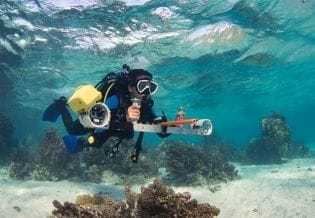Aims & Scope
International Marine Science Journal (IMSJ) publishes rigorous research on marine and aquatic systems, focusing on hydrological processes, biogeochemical cycles, ecosystem dynamics, and sustainable ocean management. We advance understanding of water-based environments through interdisciplinary science that bridges physical, chemical, biological, and geological oceanography.
Core Research Domains
Physical Oceanography & Hydrodynamics
- Ocean circulation patterns and current systems
- Wave dynamics and coastal hydrodynamics
- Tidal processes and estuarine circulation
- Ocean mixing and stratification mechanisms
- Sea level variability and coastal flooding
- Ocean-atmosphere energy exchange
Modeling the influence of El Niño-Southern Oscillation on Pacific Ocean current variability using satellite altimetry and in-situ measurements
Marine Biogeochemistry & Chemical Oceanography
- Carbon cycling and ocean acidification
- Nutrient dynamics (nitrogen, phosphorus, silicon)
- Trace metal biogeochemistry
- Dissolved organic matter characterization
- Ocean deoxygenation and hypoxia
- Sediment-water interface processes
Quantifying dissolved organic carbon fluxes in coastal upwelling zones and their role in regional carbon budgets
Marine Ecology & Ecosystem Dynamics
- Plankton ecology and trophic interactions
- Benthic community structure and function
- Pelagic ecosystem modeling
- Marine biodiversity patterns and drivers
- Ecosystem responses to environmental change
- Food web dynamics and energy flow
Assessing phytoplankton community shifts in response to warming temperatures and altered nutrient regimes in temperate coastal waters
Marine Geology & Sedimentology
- Seafloor morphology and tectonic processes
- Sediment transport and deposition
- Paleoceanography and climate reconstruction
- Submarine volcanism and hydrothermal systems
- Coastal erosion and accretion dynamics
- Marine mineral resources and geology
Reconstructing past ocean circulation patterns through sediment core analysis and microfossil assemblages in the North Atlantic
Secondary Focus Areas
Ocean-Climate Interactions
Research on ocean's role in climate regulation, including heat storage, carbon sequestration, and feedback mechanisms. Studies on climate variability impacts on marine systems, including extreme events and long-term trends.
Coastal Zone Processes
Investigations of land-ocean interfaces, estuarine dynamics, wetland hydrology, and coastal resilience. Research on sediment budgets, shoreline evolution, and human-environment interactions in coastal regions.
Marine Pollution & Contaminants
Studies on pollutant sources, transport, and fate in marine environments. Research on microplastics, heavy metals, persistent organic pollutants, and emerging contaminants. Focus on environmental impacts rather than human health outcomes.
Marine Microbiology & Microbial Ecology
Research on microbial community structure, function, and biogeochemical roles. Studies on marine viruses, bacteria, archaea, and their contributions to nutrient cycling and ecosystem processes.
Marine Biotechnology & Natural Products
Discovery and characterization of marine-derived compounds with potential applications. Research on marine organism adaptations, biomaterials, and bioprospecting. Focus on molecular mechanisms and environmental context.
Ocean Observation & Technology
Development and application of novel sensors, autonomous platforms, and remote sensing techniques. Research on data integration, modeling approaches, and technological innovations for marine science.
Emerging Research Frontiers
Explicit Exclusions
Out of Scope Topics
Clinical & Medical Research
Patient care, clinical trials, disease diagnosis, therapeutic interventions, epidemiological studies focused on human health outcomes. These topics belong in medical/health journals.
Terrestrial Ecology (Non-Aquatic)
Forest ecology, grassland dynamics, soil science without aquatic connection, terrestrial wildlife management. Must have clear marine/aquatic system relevance.
Purely Engineering Design
Ship design, offshore platform engineering, marine transportation logistics without environmental science component. Consider specialized engineering journals.
Social Sciences & Humanities
Marine archaeology, maritime history, cultural studies, social policy analysis without natural science integration. These require specialized disciplinary journals.
Article Types & Editorial Priorities
Editorial Standards & Requirements
Reporting Guidelines
- PRISMA for systematic reviews
- STROBE for observational studies
- ARRIVE for animal research
- FAIR principles for data sharing
- Transparent methods documentation
Data & Reproducibility
- Open data deposition required
- Code availability for computational work
- Sample metadata documentation
- Statistical analysis transparency
- Reproducible workflow descriptions
Ethics & Compliance
- Institutional ethics approval
- Permits for field sampling
- Conflict of interest disclosure
- Authorship contribution statements
- Funding source transparency
Preprint & Prior Publication
- Preprints welcomed and encouraged
- Conference abstracts acceptable
- Thesis chapters considered
- No duplicate submission policy
- Preprint DOI disclosure required
Publication Metrics
Ready to Submit?
If your research advances understanding of marine and aquatic systems through rigorous hydrological, biogeochemical, or ecological investigation, we invite your submission.
Contact Editorial Office

